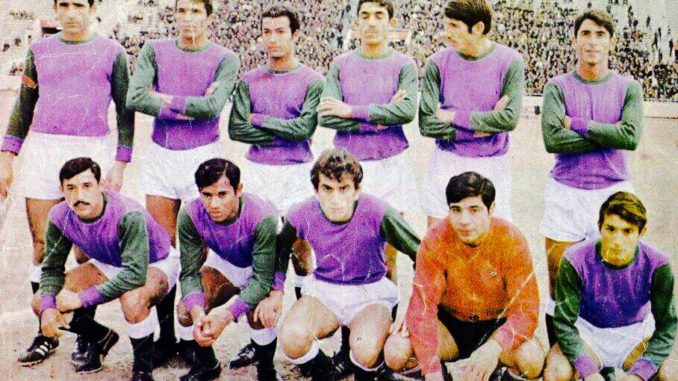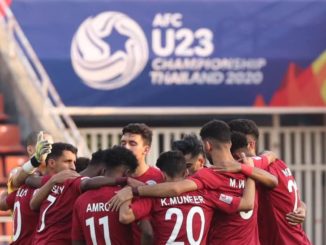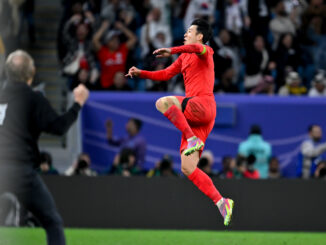
The image of Iraqi captain Abid Kadhim and his teammates walking onto field at the Supachalasai Stadium in Bangkok, raising the flag of Palestine as they jogged around the field, is looked on as a heroic stand in Iraq’s sporting history.
The Iraqi team of Aliyat Al-Shurta and its officials had decided to take the stance against their opponents, Israeli side Maccabi Tel Aviv, and sacrifice the chance to lift the country’s first Asian Club Championship, instead making a defiant political statement against the Israeli occupation of Palestine.
For one of the Aliyat players the moment was a personal one, reserve team goalkeeper Latif Shandel – playing with one eye after the loss of sight in his right eye after an infection in his youth – had lost his father in the 1948 war in Palestine at Ras Al-Ain.
The Aliyat Al-Shurta team, or Police Machinery, were one of the best teams the nation of Iraq has ever produced, winning four league titles in five seasons in the 1960s under the quiet and scrupulous trainer Mohammed Najib Kaban, who had directed the team’s ascent from the depths of the lower divisions.
However, the all-conquering team and the remnants of its illustrious history, remain only in the Baghdad District Police League, after the decision by the Iraq Football Association in 1974 to withdraw their league membership and designate only one position to one club from the Police force.
This was the year the Iraqi League was formed, for clubs rather than government institutions, and also when Nadi Al-Shurta Al-Riyadhi (Police Sports Club) was founded.
Recently the administration of Al-Shurta made efforts to claim the 1971 Asian Club Championship crown on the grounds Israel was no longer a member of the Asian Football Confederation.
History of Police Club
Al-Shurta Sports Club has 1932 on its club badge, to signify the year of its foundation, however its history is not all that straight forward. The team formed that year, is not the same entity as the club who won the Iraqi League this season. This is in contrast to Al-Quwa Al-Jawiya, a team formed in 1931 on the British airbase RAF Hinaidi, who despite playing under the name of Al-Tayaran for parts of its history, has been the same football team from its inception.
Al-Shurta has a more complicated history. In the pre-1974 years, it was considered more of a sports movement, comparable to the long-standing Soviet Spartak, Lokomotiv or CSKA sports organisations rather than a singular sports club, as the Police Sports Committee, the main Police sports authority, had various teams representing the police force.

Top (from left): Basil Mahdi, Douglas Aziz, Abid Kadhim, Masroub Asakayan, Fanous Al-Assadi
Bottom row (from left): Munaim Hussein, Mudhafar Nouri, Jassib Shand, Latif Shandel, Hormis Mikhael, Shaker Ismail
The first Police football side had been formed in 1932 and ceased being a top-flight team in 1965 after relegation. The other teams of the Police Sports Committee – Aliyat Al-Shurta, Shurta Al-Najda (Patrol Police), Quwa Al-Siyar (Mobile Force) and Kuliya Al-Shurta (Police College) – took on the mantle to represent the Police force in the Central Iraq FA League, formed of teams from the capital.
In 1974, after the formation of the new Iraqi League, the Police Sports Club was founded, with the rest of the Police teams losing their membership because of their non-club status. Aliyat Al-Shurta and the rest of the police teams instead took part in the Armed Forces League while the new Al-Shurta Club side played in the Iraq FA League.
The Directorate of Police Sports Games took issue with the decision of Iraq’s sports authorities to allocate only a single place in the new league for the Police teams and, like the Army sports authorities, decided to ruin the Iraq FA’s new league, and in act of sabotage decided to field a team of novices for the 1974-75 season.
However, after two defeats, one a heavy 11-0 defeat to Al-Naqil, the sports authorities sat down with the Police Club’s administration to solve their differences and it was agreed, players from Kuliya Al-Shurta and Shurta Al-Najda would be incorporated for the remaining matches, and Al-Shurta finished in a respectable fifth place in the Iraqi League. The following season ten players from Aliyat Al-Shurta moved to Al-Shurta.
Asian Club Championship
Iraq’s national league had not yet been formed, and so in a meeting held on February 1971 by the Iraqi Olympic Committee, chaired by the Minister of Youth Hamid Al-Jubouri, it was decided Aliyat Al-Shurta, the champions of the Baghdad League would represent the country at the Asian Club Championship in Bangkok – Iraq’s first appearance in an Asian competition.
The Iraq FA had become a member of the Asian Football Confederation at the turn of the year when they received a letter from the AFC confirming its acceptance.

The Iraq FA loaned Aliyat Al-Shurta 600 dinars (approx. USD$1680) to cover expenses for the trip to the Far East and on March 18, the 22-man delegation, headed by the Iraq FA president and former referee Fahmi Al-Qaimaqchi, the father figure of the Police football movement and the president of the Directorate of Police Sports Games, left Baghdad for the Thai capital.
The team arrived in Bangkok after a 20-hour journey and immediately began preparations for the first game against Taj Club of Iran.
The team, captained by Abid Kadhim, beat the Iranians 3-2 in the preliminary round, which was held to determine the groups, with two winners and two losers to make up the two four-team groups.
The preliminary round had been rearranged after the Iraqi team had refused to meet the Maccabi Tel Aviv in their scheduled match set to have been played on Monday, March 23.
However, as luck would have it, the two teams were grouped together in Group B with Punjab of India and Thai club Bangkok Bank. The Iraq FA protested against the draw, and Aliyat withdrew from the first game against the Israeli side but went onto beat Bangkok Bank 2-0 thanks to goals from Munaim Hussein and Sabah Hatim.
In the following game against India’s Punjab Police FC, Ghanim Abdul-Hamed scored a hat-trick to inspire the Iraqi team to an emphatic 6-1 win to progress into the semi-final.
The winger never fully realised his own potential after making a name for himself at the Asian Club Championship. He was a quick and elusive attacker who could both create and score goals and was good in the air despite his relatively short stature.
He had joined Aliyat Al-Shurta in 1969 from the Police College, but injuries hampered his career after a serious injury in 1973 saw him out of the game for 13 months and from there on Ghanim never fully recovered his old form.
In the semi-finals the Iraqi side beat Taj Club for a second time, with Munaim Hussein and Shaker Ismail on the score-sheet, setting up a final with Maccabi Tel Aviv.
However, the Iraqi team had informed the organisers of their decision to withdraw if they faced the Israeli side, and 24 hours before the final the Iraqi team officially withdrew in protest.
Aliyat’s withdrawal from the final had hit the tournament organisers in the pocket, as they made a reported financial loss of 300,000 baht (approx. approx. £5,000) according to officials from the Football Association of Thailand.
The organisers had to hastily arrange an exhibition game between Maccabi and a Bangkok Combined XI to recoup some of their losses.
It was at the presentation, after the game between Maccabi and the Bangkok Combined XI, that Aliyat players, along with their compatriots from Kuwait’s Al-Arabia, paraded around the ground waving the Palestinian flag.

This was a very different era, one which saw even the game of football utilised to highlight the struggle of the Palestinian people. The Arab countries had long refused to be a part of the Asian Football Confederation due to the presence of Israel, who in 1948 had expelled Palestinians from their land and deprived them of their basic human rights.
In 1967 came the occupation of the West Bank and Gaza, and while there was an Arab boycott of Israeli interests and linked organisations, the Arab footballing community, led by key players such as Kuwait and a few others, understood their numerical advantage within the AFC could give them a majority share and the decisive democratic vote.
On the pretext the presence of Israeli teams was hampering the advancement of the Asian game, Israel was ousted from the AFC in 1976.
Heroic return
The Iraq FA declared the loan of 600 dinars to Aliyat Al-Shurta would be considered a gift after their outstanding performances in Thailand. The Aliyat team returned to the Iraqi capital victorious and they were met with government ministers and sports figures at Baghdad International Airport, before they were paraded on a team bus as thousands of spectators lined the streets to greet the players.
In a report by the Iraqi News Agency (INA) a source claimed the plane carrying the Iraqi team from Bangkok had been the target of a sabotage attempt planned by Zionist agents. The source alleged the agent had been seized while trying to cause damage to the rear of the plane as it was about to take-off.
The head of the delegation Col. Fahmi Al-Qaimaqchi told the press: “Our great victories at the tournament and the encouragement received by us there, seemed not to the taste of the Zionists, thus they planned the sabotage attempt which was about to lead to an inevitable catastrophe.
“The withdrawal of our team in the final game and its insistence not to play an enemy team created positive reactions among the masses in Bangkok. This insistence confirmed the Arab right in its anti-Zionist struggle and led to the forming of a pro-Arab public opinion there.”
Throughout the week after their arrival, the team met with government ministers and dignitaries as they were honoured for their victories in Bangkok.
The country’s Minister of Youth Hamid Al-Jubouri told the players, “the warm welcome accorded to you on your return by the Revolutionary Government and the people reflects the sentiments of the people and the national government towards those who raise high the name of the country.
“I speak in the name of the Ministry of Youth and all sportsmen when I express high admiration for the victory you scored for your country at the Bangkok tournament.”
While Aliyat Al-Shurta were in Bangkok, their final two matches in the Baghdad Mumtaz league against Sikak Al-Hadeed (Steel Railway) and Mashat (Infantry) had been postponed. In their absence, their rivals Al-Maslaha Naqil Al-Rakab (Public Transport Service) had played their matches and were top of the table with 20 points.
Aliyat had won the Baghdad League in the previous three seasons and were in second place with 17 points. If they won both their games in hand, they would win the league title for the fourth consecutive season. However, if they dropped any points they would hand the title to Al-Maslaha.
But Aliyat Al-Shurta drew 2-2 with the Railwaymen in the first of their two remaining games and as a result conceded the title to the Public Transport team. The following season, however, they won their fourth and final league championship in 1974.
Aliyat Al-Shurta lost its license as a member of the Iraqi League and its famous name was thus confined to the history books.
Photos: Supplied




